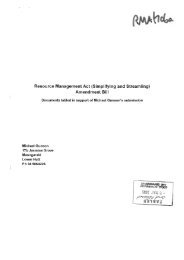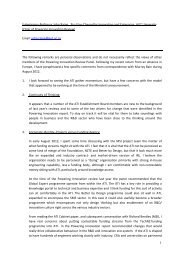Parliamentary Debates (Hansard) - New Zealand Parliament
Parliamentary Debates (Hansard) - New Zealand Parliament
Parliamentary Debates (Hansard) - New Zealand Parliament
You also want an ePaper? Increase the reach of your titles
YUMPU automatically turns print PDFs into web optimized ePapers that Google loves.
16 May 2009 Local Government (Auckland Reorganisation) Bill 3669<br />
<strong>New</strong> Part 5 Mechanisms to ensure representation of Maori, Pacific and Ethnic<br />
groups in the reorganisation of the Auckland Council<br />
Hon SHANE JONES (Labour): Tēnā tātou katoa. <strong>New</strong> Part 5 is a very grave part<br />
of the bill, because it points to the delinquency and the severity of the complete<br />
disregard for the history, constitutional, and demographic importance of Auckland in<br />
the planning for Auckland’s future mega-city status, and the complete level of<br />
ignorance about the future character of the mega-city of Auckland. That is why we<br />
stand with a degree of hope that is clouded by the bad decision-making that has guided<br />
the Minister of Local Government, Rodney Hide, to date, which has resulted in his<br />
isolating, marginalising, and completely neglecting a growing percentage of Auckland’s<br />
population.<br />
In 1867 Donald MacLean derived a response to the growing unrest amongst iwi that<br />
the Crown was governing the country without any inclusion of a meaningful nature of<br />
Māori. That was when statutory Māori representation—after the failure of the rūnanga<br />
experiment early in the 1850s—took root. This part is an extension of that. Why would<br />
a modern nation want to provide distinctive Māori representation in its largest city, as it<br />
seeks to use that city as a catalyst to transform the wider economy? Why would it want<br />
to do that? Not only because of heritage but because the reality is that these are the<br />
people whose population percentage is growing disproportionately faster. They are the<br />
Asian proportion, they are the tangata whenua in a broader sense, and they are the<br />
Pasifika people. So what is being asked for here is a continuation of that proud tradition<br />
that exists at the level of national Government.<br />
Nā reira, ko tāku ki te Whare, he aha oti te raruraru me whakaae tātou kia<br />
waihangatia wēnei tūranga Māori hei noho, e kitea ai te kanohi Māori i te aroaro o te<br />
motu; ngā tūru Māori e rua, mā te marea me tētahi atu tūru motuhake mō ngā tāngata<br />
whenua? Nui noa atu te pōuri ahakoa te moe tahi a Te Pāti Māori ki ō rātou hoa, kāhore<br />
he paku aroha e puta ana ki a rātou.<br />
[An interpretation in English was given to the House.]<br />
[So, mine to the House; what problem is there that we agree to create these Māori<br />
positions to enable the face of Māoridom to be seen before the nation—the two<br />
positions for Māori, for the public, and a special one for the people of the land? I am<br />
greatly saddened that although the Māori Party has bedded together with their<br />
colleagues, they display no compassion for them.]<br />
Hon Trevor Mallard: I raise a point of order, Mr Chairperson. I apologise. This is a<br />
matter in which I have no expertise, but I think, from my limited knowledge, that we<br />
might have had a slight miss in the interpretation right at the end. I think the “two” that<br />
my colleague outlined was for Māori seats and the “one” was for mana whenua. I think<br />
it is important that we get that right.<br />
The CHAIRPERSON (Lindsay Tisch): Thank you. If there was a wrong<br />
interpretation, I am sure that when the member resumes his speech he will pick up on it.<br />
I am leaving that to the discretion of the Hon Shane Jones. Was there a mistake in the<br />
interpretation, or was it accurate? If there was a mistake, you have an opportunity to<br />
correct it.<br />
Hon SHANE JONES: I shall take that opportunity. With due respect, this<br />
correction, I am sure, is not included as part of my formal speech. I mean absolutely no<br />
disrespect to the interpreter, a senior scholar of our language, but the essential point is<br />
that my proposed new part corrects the absence of tangata whenua and mana whenua<br />
representation, and provides two slots for Māori in general.<br />
The CHAIRPERSON (Lindsay Tisch): My proposition to you was about the<br />
interpretation provided by the interpreter. Did the interpreter report accurately what you






![Full evidence text [PDF 8908k] - New Zealand Parliament](https://img.yumpu.com/14025494/1/184x260/full-evidence-text-pdf-8908k-new-zealand-parliament.jpg?quality=85)
![−3 JUN 2009 IRELEASED] - New Zealand Parliament](https://img.yumpu.com/12829724/1/185x260/3-jun-2009-ireleased-new-zealand-parliament.jpg?quality=85)
![Full paper text [PDF 3515k] - New Zealand Parliament](https://img.yumpu.com/11267192/1/184x260/full-paper-text-pdf-3515k-new-zealand-parliament.jpg?quality=85)


![Full evidence text [PDF 9k] - Parliament](https://img.yumpu.com/7938085/1/184x260/full-evidence-text-pdf-9k-parliament.jpg?quality=85)





